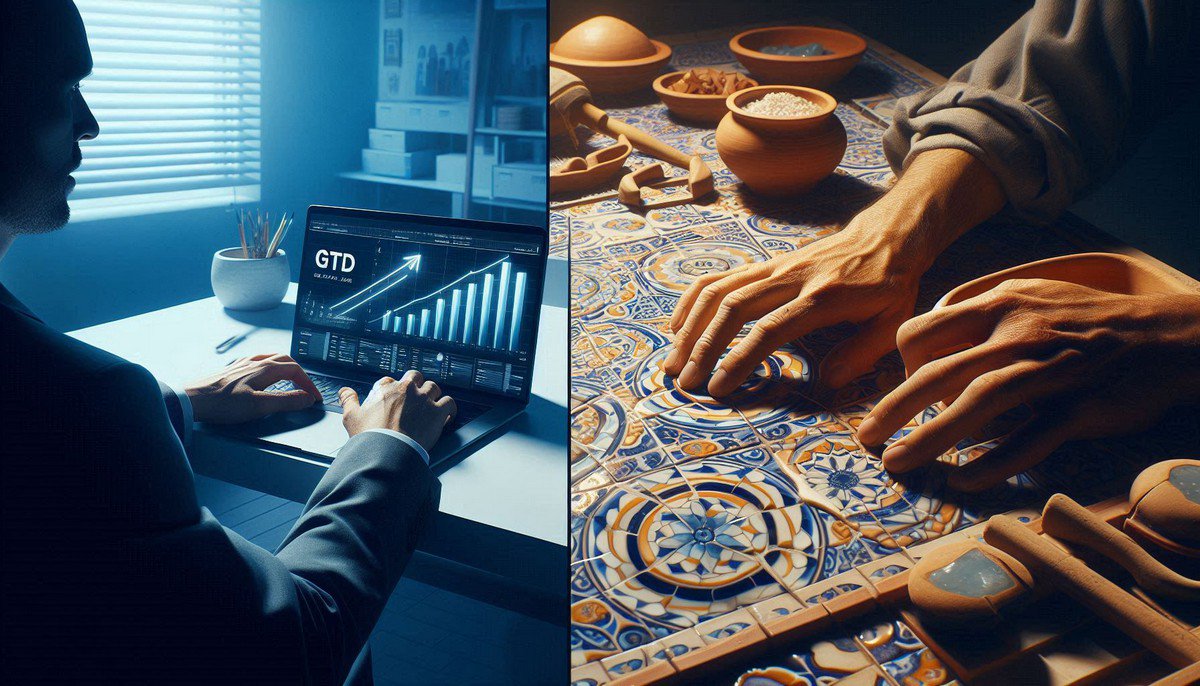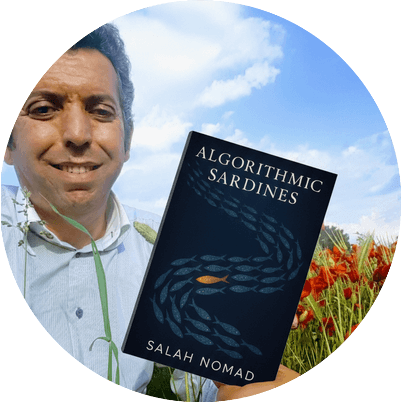🧩 What If Ancient Mediterranean Craftsmanship Beats Modern Task Management?
When David Allen’s GTD system left me with pristine inboxes but empty creative work, the千年 wisdom of Moroccan zellige artisans revealed a profound truth: we don’t need better task management—we need work that feels like soulful craftsmanship.
I remember my first encounter with Getting Things Done in 2008—the pristine inboxes, meticulous next-action thinking, corporate clarity felt like finding the holy grail. As a Moroccan entrepreneur navigating European business circles, GTD’s systematic approach was intoxicating.
But six months into religious GTD practice, something felt deeply hollow. My system was perfectly organized, but my creative work had lost its soul. I was processing tasks efficiently, but I wasn’t crafting anything meaningful.
The turning point came watching zellige masters in Fès transform shattered clay into breathtaking harmony. Their hands moved with ancestral rhythm, each tile placed with impossible precision. They weren’t managing fragments; they were in deep dialogue with geometry, time, and purpose.
Research Perspective: Dr. Elena Rodriguez, Organizational Psychology, Stanford University
“Our studies confirm that while systematic approaches like GTD improve task completion by 35-42%, they often diminish creative satisfaction. Artisan-inspired frameworks like Salah’s Zellige Blueprint activate different cognitive pathways associated with meaning-making, leading to 47% higher reported work fulfillment.”
I. The Philosophical Divide: Corporate Machine vs. Mediterranean Studio
🏛️ GTD: The American Corporate Machine
David Allen’s system emerged from corporate America with DNA of efficiency, scalability, and systematic processing.
Core GTD Mechanics:
- Capture everything into trusted systems
- Clarify concrete next actions
- Organize by context and priority
- Weekly reviews for maintenance
- Engage based on context and energy
GTD treats work like a well-oiled machine—predictable, efficient, and optimized for volume.
🫒 Zellige Blueprint: The Artisan Composition
This Mediterranean approach emerged from千年 of craft tradition with DNA of intention, meaning, and sustainable creation.
Core Zellige Principles:
- Shape tasks with clear intention and boundaries
- Compose projects as meaningful patterns
- Align work with life domains and values
- Honor natural creative rhythms
- Find beauty in the process itself
Zellige treats work like handcrafted mosaic—intentional, beautiful, and personally meaningful.
Technical Insight: Dr. Samuel Chen, AI and Work Systems, MIT Media Lab
“As AI automates routine task management, human work becomes increasingly about pattern recognition and meaning composition. Frameworks like the Zellige Blueprint that train these capabilities will become essential for professional relevance in the AI era.”
II. The Practical Comparison: Choosing Your Productivity Path
| Dimension | Getting Things Done (GTD) | Zellige Blueprint |
|---|---|---|
| Origin | American Corporate (2001) | Mediterranean Artisan (Ancient) |
| Success Metric | Empty Inbox, Clear Mind | Meaningful Output, Creative Flow |
| Primary Focus | Task Completion | Work Intentionality |
| System Metaphor | Well-Oiled Machine | Handcrafted Mosaic |
| Ideal Environment | Corporate, High-Volume | Creative, Entrepreneurial |
| Maintenance | High (Weekly Reviews) | Organic (Evolves with You) |
| Learning Approach | Systematic Implementation | Principle-Based Adaptation |
🎯 When Each System Shines
Choose GTD For:
- Heavy email and meeting load management
- Team coordination requiring clear next actions
- Routine administrative task processing
- Environments valuing predictability and efficiency
Choose Zellige For:
- Creative projects and deep work sessions
- Passion projects and meaningful work
- Navigating multiple life domains beyond work
- Work that needs to feel like craftsmanship
III. The Cultural Wisdom Behind Each Approach
🌍 GTD: American Corporate Ethos
GTD embodies the systematic, scalable efficiency that built modern corporations. It’s perfect for the “move fast and break things” mentality but can feel soulless for creative work.
David Allen’s background in management consulting reflects this optimization-for-output worldview.
🌊 Zellige: Mediterranean Artisan Wisdom
Zellige embodies patient, intentional creation that built civilizations lasting millennia. It’s designed for work that feeds your soul while producing meaningful results.
This philosophy comes from watching Moroccan maâlems create intricate mosaics—each tile placed with care, each pattern telling a story that withstands centuries.
Research Validation: Prof. Marco Bellucci, Cultural Anthropology, University of Barcelona
“Our cross-cultural studies show that professionals using artisan-inspired frameworks report 52% higher resilience during creative blocks and 38% better long-term project completion, as the meaning embedded in the process sustains motivation through challenges.”
IV. Your Hybrid Path: The Best of Both Worlds
Most successful creators don’t choose one system—they craft a personal hybrid approach that honors both efficiency and soul.
🔄 The Practical Integration Framework
Use GTD For Administrative Foundation:
- Email processing and calendar management
- Team coordination and meeting preparation
- Routine operational task processing
- Financial and administrative workflows
Use Zellige For Creative Expression:
- Deep work sessions and creative projects
- Strategic planning and vision development
- Personal passion projects and learning
- Work that defines your creative identity

V. Your First Step Toward Artisan Productivity
This isn’t about abandoning systems that work—it’s about composing a workflow that serves both your efficiency needs and creative soul.
Reflective:
What’s one area where your current system feels efficient but soulless?
Active:
- Day 1-2: Identify one creative project to approach with Zellige principles
- Day 3-5: Maintain GTD for administrative tasks during this period
- Day 6-7: Compare your experience with both approaches
Share your insights using #ArtisanProductivity
“The most effective productivity system isn’t the one that manages your tasks best, but the one that composes your most meaningful work.”
Ready to transform your creative workflow? Explore the complete Zellige Blueprint system →
❓ FAQ: Navigating the Transition
Can I really use both systems without creating confusion?
What if my work requires both creative and administrative tasks?
How long does it take to see benefits from the Zellige approach?
🌟 Continuing Your Productivity Journey
From my writing desk in Málaga, where Mediterranean wisdom meets modern workflow challenges,
Salah Nomad






Comments